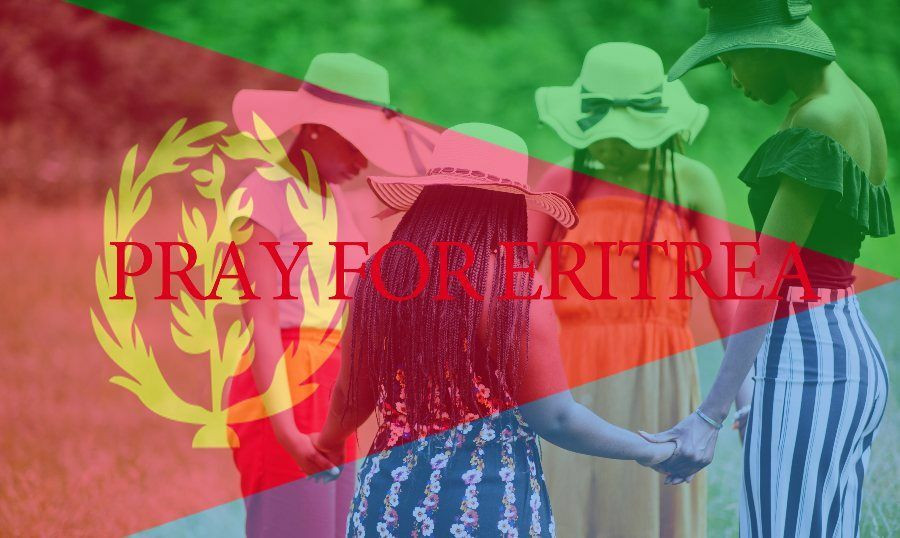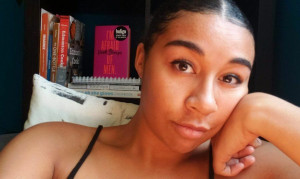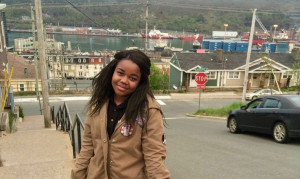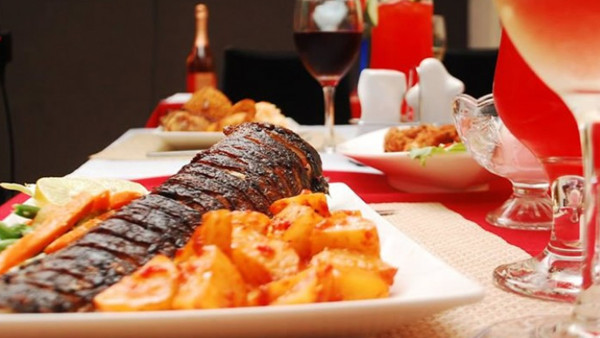When news spread of a missile attack by the Ethiopian Tigray People’s Liberation Front (TPLF) on Eritrean soil in mid-November, it transformed the internal Ethiopian conflict to a transnational one. Rockets fell into the Eritrean cities of Dekemehari, Gemehalo and Nefasit. Ethiopians and Eritreans, alike, feared what this could mean for citizens on the ground. My family feared what this could mean for us, our people and country at large.
Internal conflict in Ethiopia between the federal government and TPLF began in November 2020 and is still ongoing with death tolls in the Tigray region rising to over 60,000 people with over 950,000 people that have been displaced from their homes.
The historic peace agreement made between Ethiopia and Eritrea in 2018 ended 20 years of sporadic conflict, but Eritreans remained skeptical of what this new relationship between the leaders would entail. The Eritrean government had used the “no war, no peace” mandate with Ethiopia to justify their most repressive policies, and many hoped that the peace deal would garner respect for human rights in Eritrea. But little has changed since.
Evidence of Eritrean involvement in supporting the Ethiopian government in the five-month-long war was initially reported by a U.S. government source and diplomats. Although both nations have denied Eritrean involvement, both nations consider the TPLF a mutual foe.
Isaias Afwerki, president of Eritrea, and the TPLF fought as allies during the liberation struggle against the communist Derg in Ethiopia, between 1974-1991. But the violent war that occured between Ethiopia and Eritrea in 1998-2000 over the Badme region, destroyed the solidarity on both sides, effectively putting Eritrea in a state of emergency.
But what must be understood is that the catalyst of the current conflict occurring in the Tigray region had nothing to do with Eritrea or the Eritrean people. A power struggle between Tigrayans, Oromo and the Amhara’s governments has been occurring for years which is the underlying current of the war.
According to Efrem, a refugee who fled Eritrea in 2017, “There’s a lot of propaganda going on. By the Ethiopian side, the Eritrean side and by the TPLF. The prosperity party in Ethiopia as well. There’s a lot of division going on. Ethiopian politics have become ethnic and racial. Every Tigrayan is in support of the TPLF. Every Amharan is in support of the prosperity party. And that’s a major problem because there’s no solution that can come from war cause everyone should stand for peace and not war.”
Abiy Ahmed, current Prime Minister of Ethiopia, held off on the parliamentary elections in 2020 due to the risk it would be to send millions to the polls during a pandemic. TPLF defied Abiy’s decision and ran their own elections in the Tigray region. Abiy declared their election to be illegal and consequently, cut off funding to the Tigray region. The TPLF responded by attacking the federal military base -- triggering the war that we see today.
What is NOT getting enough coverage is the devastation this has caused on the Eritrean people, both locally and abroad. Not only are thousands of Eritrean refugees in the Tigray region being killed, abducted and forcefully returned to Eritrea, but there is a horrible hunger crisis happening there. The current circumstance is a symptom of a deeper problem in Eritrea.
Since 2001, the Eritrean government started exercising totalitarian and brutal control of the entire country. The government started by closing all independent newspaper stations, arresting journalists and government officials who have criticized Isaias. Eritrea denies its citizens rights based on political opinion and religion, and citizens have no say in the running of the government. The Eritrean constitution, which was approved in 1997, was never implemented and there have been no national elections since the country’s independence.
Efrem explains, “When you are young and you are brainwashed, you don’t get what’s happening. I was born and raised in the system, so I didn’t know any better. So when you’re born into oppression and you have nothing to compare to, you don’t even know that you’re being oppressed. If you’re born into it you think that’s just the way the world is. The state-owned media tells you that Eritrea is a safe haven and the world is chaotic and deadly. And this is what we’re being told all of our lives.”
One of the most egregious problems that is causing thousands of young Eritreans to flee their country is the indefinite national service. Starting from their last year of high school, young Eritreans are expected to serve indefinitely in the military or civil service, called Sawa, under inhumane conditions. As Efrem remembers, “When I went to Sawa, the oppression was so evident. It was in your face.”
Leaving the country is unlawful and punishable, so most leave undercover each month into countries like Sudan and from there migrate to other countries. Many have lost their lives on route -- many due to the “shoot-to-kill” policy that the Eritrean government has established among other things. “Despite how dangerous it is to escape to Ethiopia, Sudan and Libya, people are still choosing to go that way instead of staying in Eritrea,” Efrem admits.
Fleeing citizens who aren’t killed are usually arrested and not subject to judicial review or appeal and never brought to trial, thus rotting in jail with families not knowing their whereabouts for years.
Arbitrary arrest within Eritrea is also a huge cause for concern. Government informants have been responsible for the arrests of citizens who have publicly criticized Isaias, completely restricting freedom of speech. Families are struggling to understand the circumstances in Eritrea due to even phone calls being tapped, both local and long distance phone calls. This isn’t any different when Efrem calls back home. “What they say is, they don’t speak anything. They don’t want me to speak anything too because they fear for their lives. And I understand that too. But when I call and ask how they are they’ll always say they’re doing fine because their phones are being tapped. They don’t want to risk anything. I try to talk more but like you can’t even have a normal conversation because it's so awkward knowing someone else is hearing your conversations.”
All of these human rights violations have lasted for 20+ years in Eritrea putting the country in a very fragile state, with the war, hunger crisis and pandemic only exacerbating these issues.
Eritrean immigrants, refugees and the diaspora, have had polarizing opinions on the political landscape of Eritrea, which many have argued is the reason why Eritrea as a country hasn’t progressed. As Efrem puts it, “Many Eritreans in the diaspora are saying that what is happening in Ethiopia is none of our concern. While another majority of people are saying the opposite. But they are not considering Ethiopia as a whole. They are still taking sides and that’s also a problem.”
As an Eritrean diasporan myself, the polarizing opinions of Eritreans has become frustrating. Many of my relatives are refugees who have been heavily impacted by the repressive rulings.
So many of us don’t know what it means to have true liberation and justice in Eritrea because all we’ve known is totalitarianism and war. There is resentment and frustration in the eyes of those who send hundreds to thousands of dollars back home every month, to keep afloat family who the Eritrean regime continues to neglect. There is sadness on their faces when the likelihood of them visiting Eritrea lessens every year. Their eyes fill with tears when families back home beg them to send food because money is not enough anymore.
The transportation ban that was started as a response to COVID-19 has exacerbated the food and water crisis in Eritrea, leaving local markets nearly empty of supplies with food being too expensive to purchase for many. My family and many others have now resorted to sending cargos of food and clothes from Canada to Eritrea via boats. Remittance and food being sent back home is one of the top reasons as to why Eritrea and it’s people have survived for this long. Isaias Afwerki is a ruthless dictator and never cared for the survival of his people. Involving Eritreans into the current Tigray war is the biggest indication of this.
As Efrem adds, “On the Eritrean side (pro-government/PFDJ) are siding with Abiy because Isiaias sided with him. Those who have been affected by the Tigray people feel like justice is being served to the Tigray people because of what the Tigray people have done to them. But this is going to lead into another cycle of revenge with no end.”
To the Eritreans and Ethiopians on the outside, we cannot afford to allow our political differences to be the reason we turn a blind eye on what is happening. The war must come to an end because our people are dying from displacement, war and hunger. The most vulnerable groups, the Eritrean and Tigrayan refugees, are the ones being systematically raped, brutalized and killed at disproportionate rates. Osman, an immigrant in Canada, expresses, “This war has exacerbated a huge humanitarian crisis amongst Ethiopians as well as Eritrean refugees.The extent of negative impact of the war is far-reaching beyond the parties in the conflict. So, we all have duties and obligations to help people affected in every way we can regardless of who they are. This can be done through various NGOs and humanitarian organizations. Also by calling for the halt of hostilities and seeking political solutions.”
We must speak up for those that can’t on the inside and put pressure on all governments to implement necessary changes for the survival of our countries and our people. All governments and groups, which includes the Ethiopian, Amhara, Eritrean and TPLF, must be held accountable for the thousands that have died and been impacted by the war. “All parties are to be blamed for they had many other peaceful political options and ways to avert war,” Osman declares.
As we all continue to bring awareness to ending the war, resources are below to support the civilians and refugees being impacted the most. This open-source document is a great start.
Initiatives
ODS 2001 Magazine - ODS' Inaugural publication, commemorating the year that Eritrea's free press was shut down. Entries include personal anecdotes, political analyses, art and more. 100% of the proceeds will go to our newly opened Eritrean Refugee Centre.
Help Eritrean Refugees Who Have Fled Tigray - Refugees have been fleeing violence since late November 2020, and around 4,000 people are now destitute in the Ethiopian capital city, Addis Ababa. You can contact This email address is being protected from spambots. You need JavaScript enabled to view it. with a receipt of your donation if you want more detailed updates about the distribution of the funds.
Medical Aid For Rape Survivors in Tigray - The purpose of this fundraiser is to raise money to buy feminine hygiene products, contraceptives, and medication for the rape survivors taking refuge in Ayder Hospital in Mekelle and the several schools that have been turned into makeshift hospitals and refugee camps due to the ongoing violence and war in Tigray.
Make Injera Not War -- 100% of proceeds go to Operation Rescue, an NGO based in the capital of Tigray.
HanansCorner - Hanan is an Eritrean artist based in Canada. 100% of proceeds from her "Gual Tigray" illustration (which is on multiple items in her store) will be donated to ETHAR Relief.
Tigray Resources - (compiled by @eedeen_ on Twitter) - Where to donate, petitions to sign, social media to follow, articles to read, etc.
The Eritrean Women's Center in Tel Aviv, Israel distributed food to another 200 families hit by COVID. With 80% unemployment and no access to public services due to a lack of legal status, this aid is critical for the community. Donate here.
#LetEriKidsLearn - The #EndHighSchoolInSawa campaign is advocating for Eritrean children to have access to education. Learn more about #LetEriKidsLearn on this Twitter thread and learn how you can volunteer here.
Donations: best way to support Eritreans for basic necessities is to send supplies and money directly to them.
To support civilians and refugees in the Tigray region:
Tigray Emergency and Disaster Relief Fund
Raya Development Association in Canada : Donate (link expired)
Help families in Tigray suffering from the war
Rise Up For Those Displaced in Tigray(link expired)
Money supports the refugees in Sudan:
ARAHA - American Relief Agency for the Horn of Africa
Ethiopian Youth Refugees in Sudan
Emergency Aid for Tigrayan Refugees in Sudan
Tigray Refugees Relief Tri-State Go Fund Me
Petitions
Stop Ethiopia and Eritrea’s Genocidal War on the people of Tigray
Appeal to the UN to prevent imminent starvation and a humanitarian crisis in Eritrea
Advocacy Organizations
One Day Seyom - a youth-led organisation campaigning to end human rights abuses committed against the Eritrean people and supporting Eritrean refugees worldwide.
ARAHA - ARAHA strives to alleviate human suffering and build self-reliant communities, by providing humanitarian aid and empowering individuals in the Horn of Africa and here at home. **And directly assisting refugees in Sudan**
Eritean Community Connections - WA based group providing social services for vulnerable Eritreans. Provides services such as immediate assistance (basic needs), technical/professional support as well as emotional/spiritual support.
Bayto Yiakl - USA - The Eritrean diaspora community who are residing in different countries of the world have risen vigorously and voiced the word “Yiakl” meaning “Enough is Enough” to express their dismay to the decades long excessive violations of human and democratic rights by the ruling PFDJ regime in Eritrea to our citizens back home.
Network of Eritrean Women - UK- promoting women's rights; raising awareness within the Eritrean community towards ending gender inequalities, violence against women and harmful practices such as forced marriage and FGM.
revolutionERI - donating 100% of proceeds from thier masks to Eritrean refugees in Libya.
Eritrean Women's Community Center in Israel - The Eritrean Women's Community Center is a unique grassroot project in Tel Aviv set up to support and empower Eritrean refugee women living in Israel.
Reclaim Eritrea - Reclaim Eritrea is a nonprofit 501(c)(3) online news platform and advocacy group operated exclusively to educate and inform the public through in-depth investigative journalism about civic and regional issues so individuals can become advocates for good government and social progress.
Eritrean Movement for Democracy and Human Rights (EMDHR) - Founded in December 2003 by Eritreans in the Republic of South Africa in response to the absence of civil and democratic rights of citizens and lack of rule of law in Eritrea. The EMDHR believes that a sustainable democracy, rule of law and respect of human and democratic rights can only be achieved through non-violent, indigenous and positive reform based on full comprehension, awareness and participation of the general public.
Da'aro Youth Project - Da'aro Youth Project was established in 2018 by members of the Eritrean community in London in response to the deaths of a number of teenage Eritreans by suicide. We aim to promote the wellbeing of these migrant young people living in the UK, through direct support, through building bridges in the Eritrean community and through advocating for changes to unfair and discriminatory systems which undermine their wellbeing.
Eritrean Assistance Organization in Chicago (EAOC) - In 2016, our soccer teams (Selam & Maranatha) came together around the love we have for the game and our Eritrean heritage. EAOC now works to help refugees and vulnerable Eritreans adjust to life in the Chicagoland area and bordering states.
Eritrea Focus - Eritrea Focus is an association of Non-Governmental Organisations (NGOs), human rights organisations, exile and refugee groups and individuals concerned with the gross abuses of human rights in Eritrea.
EvolutionEri - revolutioneri was born to share with the world the inspirational lives and stories of strength, beauty, defiance, resilience, integrity and sacrifice of eritreans who have paved the way for the rise of the new generations.
Snitna - Our aim is: to cultivate peace, harmony and reconciliation among all Eritreans, by involving Eritreans from different walks of society, without discrimination. Fostering Eritrean unity is the root-foundation of our mission.

 By
By 






